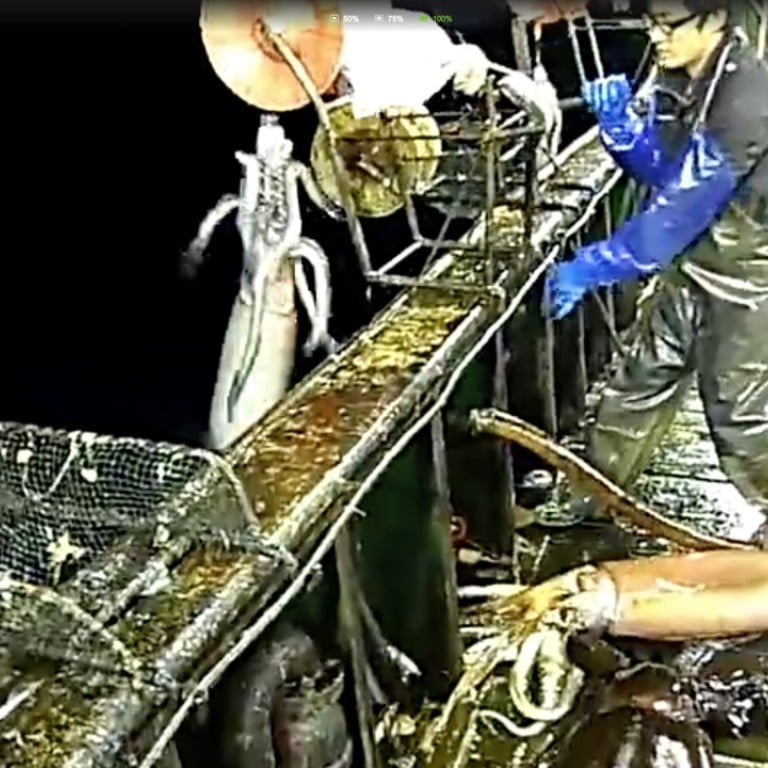
How China’s squid fishing programme is squeezing its neighbours and creating global sea change
A government estimate of China’s share of the market underlines its ability to set the agenda, through numerical advantage and demand for its data
China has been accused of using its dominance of the world’s supply of squid to provide low-quality seafood to other countries and virtually monopolising the fishing in neutral waters.
Critics have said China keeps high-quality squid for domestic consumption, exports lower-quality products at higher prices, overwhelms vessels from other countries in major squid breeding grounds, and is in a position to influence international negotiations about conservation and distribution of global squid resources for its own interest.
Fishing ships from China have accounted for 50 to 70 per cent of the squid caught in international waters in recent years, effectively controlling the supply of the popular seafood, according to an estimate by the Chinese government.
An official document detailing the figure earlier this year – which was not intended to be seen by overseas readers, according to researchers involved in the drafting – appeared to confirm the fears that have been growing in the global seafood industry about China’s dominance.
A price hike for squid bought by the United States from China has been accompanied by a decline in quality, while Taiwanese fishing boats have lost out to mainland Chinese boats arriving in larger numbers, it is claimed.
Watch: the industrial fishing of squid by Chinese boats
But to China, catching squid is about more than seafood.
It is “a small but important step in the long march to conquer the world’s oceans”, said one lead researcher in the government’s global squid fishing programme.
Tracking creatures as elusive as squid in seas around the globe requires sophisticated intelligence, technology, organisation and financial support from government.
Beijing, harbouring ambitions to be a marine superpower, had been doing it as an “exercise” to strengthen its muscle in the world’s oceans against other naval powers, said the researcher, who requested not to be named because of the issue’s political sensitivity.
NET GAINS
The world’s population eats more than 2.7 million tonnes of squid per year, or at least one plate for each person on the planet, according to the United Nations Food and Agriculture Organisation.
The Spanish fried calamari and Japanese squid noodle, for example, provide not just proteins but other nutrition including zinc, manganese and vitamins.
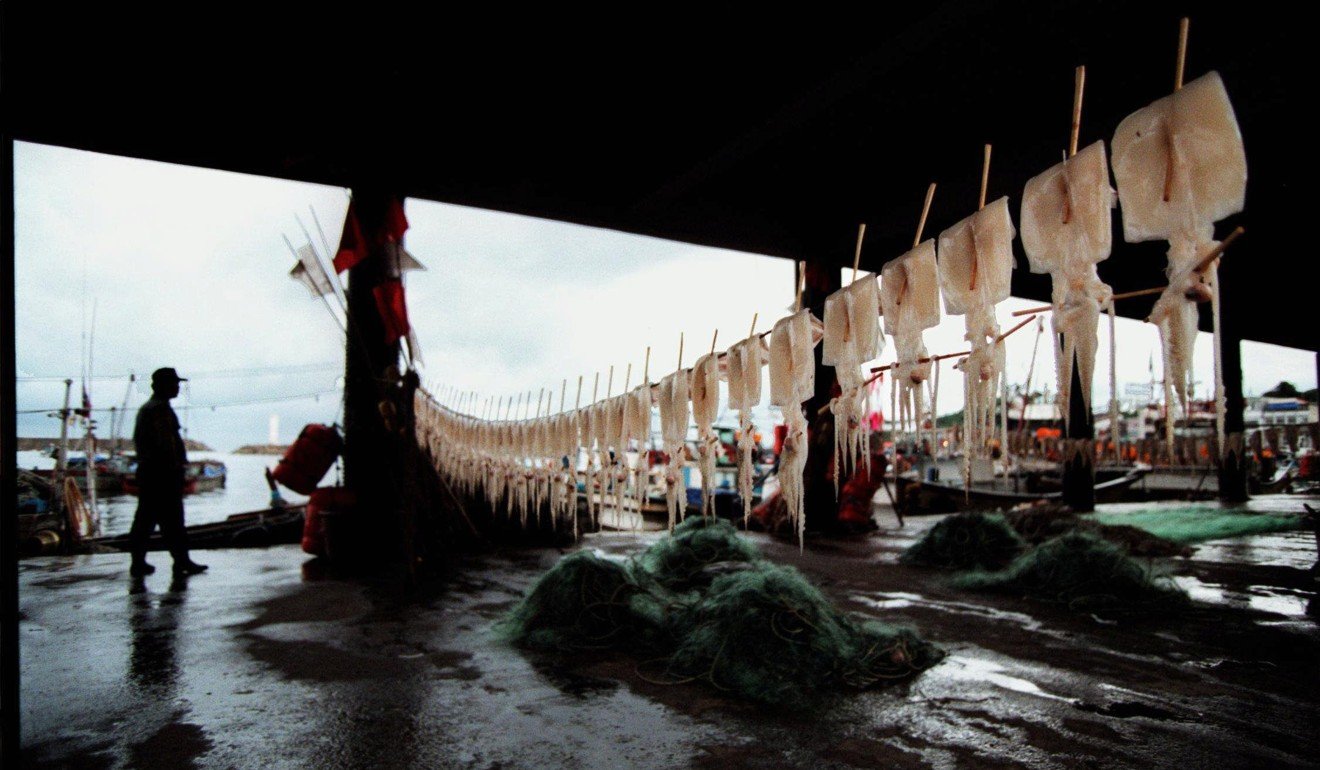
Around the world, from the Mediterranean to California to Tokyo, squid has become one of the most popular staples in restaurants because it is tasty, healthy and relatively cheap.
To satisfy demand, thousands of vessels roam the oceans each year to capture these shy creatures with specialised equipment.
The ships lower fishing lines, each carrying a large number of hooks, to waters about 100 metres (330 feet) deep. The hooks have lights attached to attract the squid, which are then pulled up to be gutted and sent to a freezing chamber.
This fishing method, known as jigging, was invented by Japanese fishers after the second world war and has been used on an unprecedented scale by the Chinese in recent years.
ARMED WITH DATA
Each week, sea captains of hundreds of Chinese jigging boats receive a briefing from the government. It contains the latest forecast of the size and location of major squid colonies in the world’s oceans.
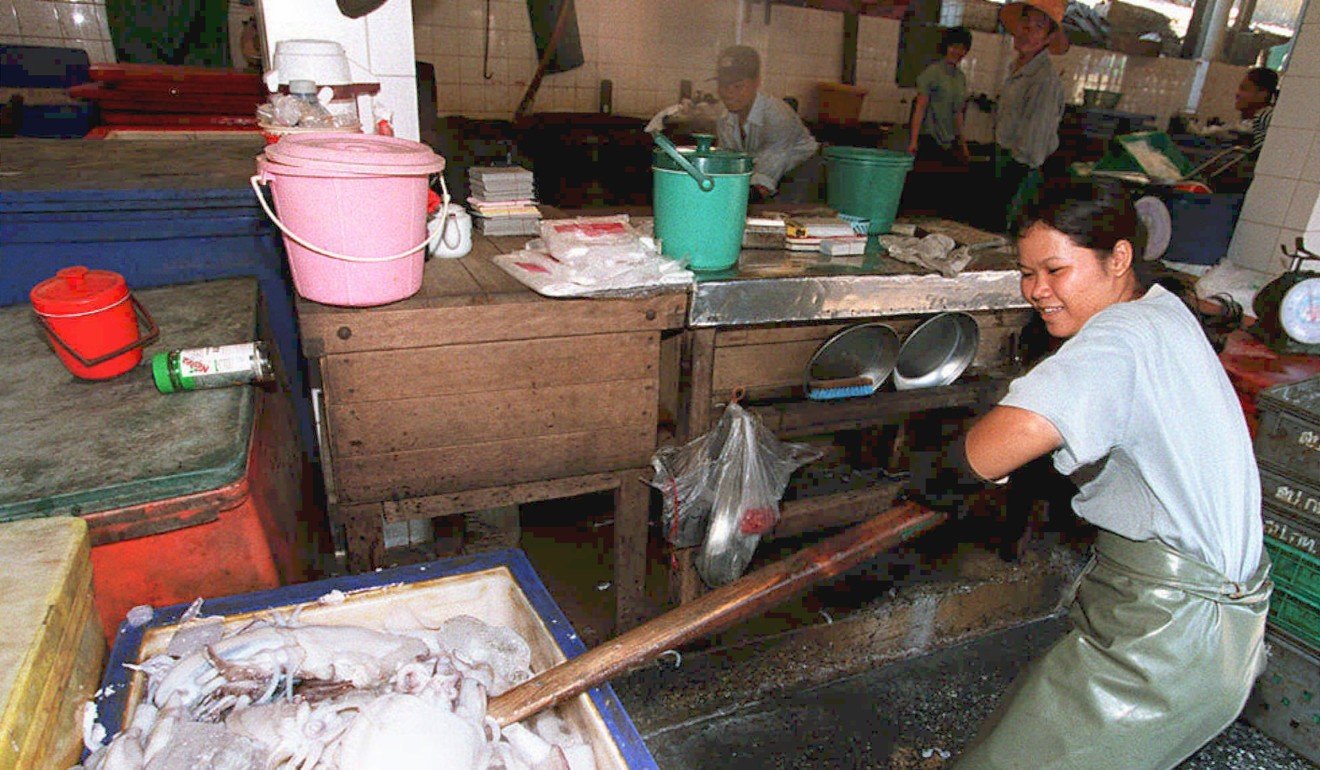
The growth and depletion of squid colonies was difficult to track and predict because of their short lifespan, said a researcher with Shanghai Ocean University who was involved in the largest squid research project funded by the central government.
Most squid species fished commercially live no longer than a year. This gives scientists less time to collect data about their life cycle, making modelling for fisheries forecasting more challenging.
The squid forecast issued by the Chinese government, however, is claimed to have an accuracy ranging from 70 to 90 per cent, using the world’s largest squid surveillance network.
Satellites and government research vessels collect large amounts of data to help researchers monitor and predict growth and movement of squid colonies in open waters not claimed by any countries.
“We have found several new [squid] fisheries in recent years, and it is very likely more will be found in the future,” said the Shanghai-based researcher, who asked not to be named because he was not authorised to speak to the media.
Besides funding the research, the Chinese government has also spent billions of yuan each year subsiding diesel consumption, construction of larger, more advanced jigging vessels and even sending medical ships to fishing grounds to improve Chinese fishers’ health to help them carry out longer, more productive operations.
FLEXING STATE MUSCLE
Dr Enric Sala, founder and leader of the US National Geographic Society’s Pristine Seas project, said its data showed that China caught 60 per cent of the squid in the high seas by value.
This matched the estimates of the Chinese government, he said.
But squid fishing was often a money-losing business, and this was especially the case for China, which sends boats to waters as distant as those off Argentina – a major squid fishing ground also visited by boats from other countries – where the price of squid may not even pay for the fuel, according to a recent study by Sala and colleagues.
“Even though some high seas fisheries are profitable, squid fishing and deep bottom trawling would not make sense without subsidies,” Sala said. “Governments are throwing massive amounts of taxpayers’ money into a destructive industry.
“The Chinese government’s research to allow Chinese ships to locate and fish squid is another form of subsidy.”
Watch: fishers operating in the East China Sea
In South Korea, meanwhile, the price of squid increased by more than 40 per cent last year, according to Yonhap News Agency.
South Korean fishers accused Chinese fishing boats of catching too much squid in the East China Sea and causing a sharp decline in squid numbers in Korean waters.
“Our boats are only able to catch 15 per cent of the squid raked by Chinese boats,” Park Jung-gwi, a harvester in the major fishing hub of Sokcho, was quoted as saying in January by Yonhap.
“We lure squid with lights, using traditional methods. But Chinese boats are literally sweeping the ocean floor.”
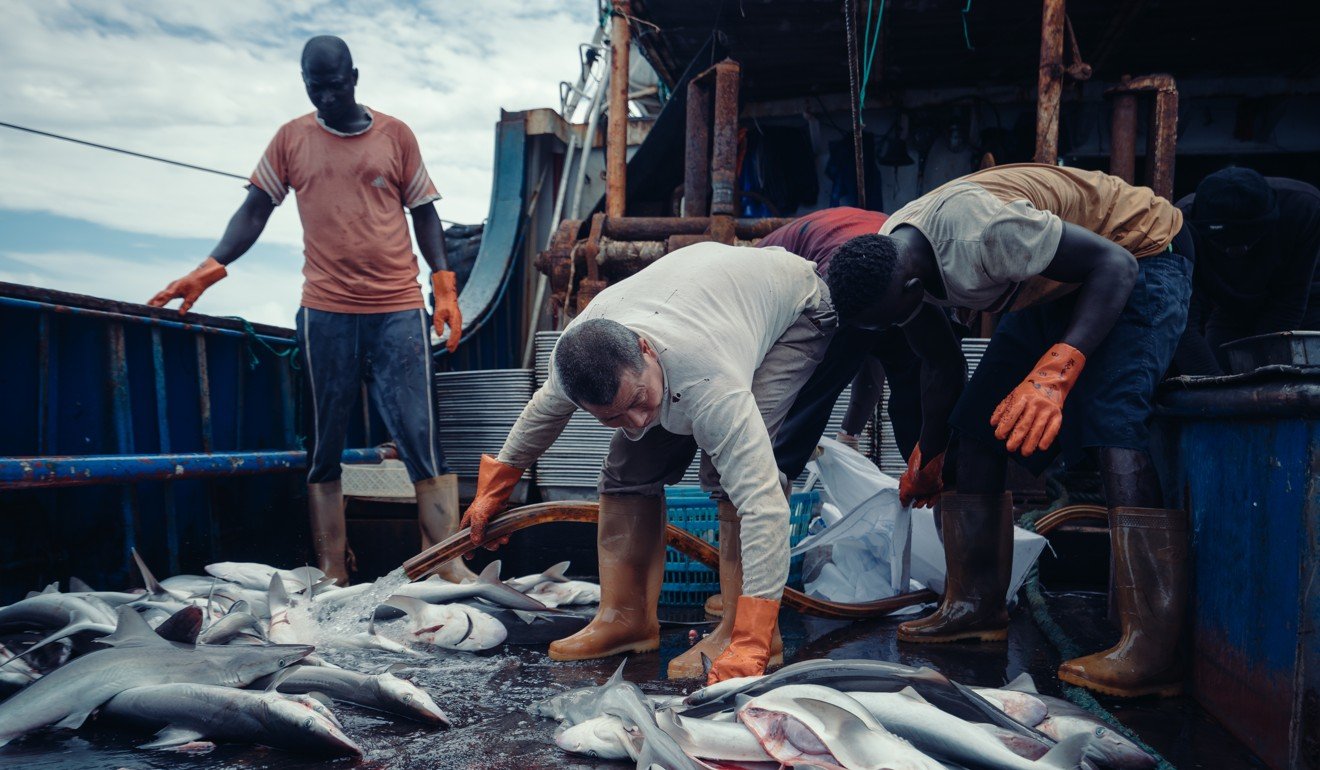
Park said his profits had dropped nearly 60 per cent in recent years because of unfair competition from Chinese counterparts, threatening his ability to pay for fuel.
The quantity of squid caught by South Korea fell by 48 per cent between 2003 and 2017, according to the Korea Maritime Institute. Japan’s total catch for the same period dropped 73 per cent, the institute said.
GROWING INTO A LEADING ROLE
Tian Yongjun, professor at the fishery department with Ocean University of China in Qingdao, Shandong province, said China’s 70 per cent share of the squid caught in international waters, if the figure was reliable, amounted to a degree of dominance that it was “uncommon” for a country to claim over an abundant species in open water.
It was not surprising, however, considering China’s growing power in the world’s oceans, he said.
China has been expanding its naval force faster than any other country. There are four fleets of naval ships under construction, and the Chinese government sends a large number of advanced research vessels to the world’s oceans looking for minerals, oil and other natural resources.
But compared with Western countries, which started high sea fishing much earlier and now also devoted considerable efforts to conservation, China “still has a long way to go” before it could claim itself to be a marine power, Tian said.
“Our role is still weak in many international fishery organisations. We need to do more research and work to improve the sustainability [of fishery resources],” he said.
Han Han is founder and executive director of China Blue, a non-governmental organisation promoting sustainable fisheries and ocean conservation in Haikou, on the island of Hainan. She said overfishing had caused damage to some offshore squid resources in China, and her organisation was working with local authorities to rebuild these fisheries.
“It must also be the case in international waters,” she said. “The Chinese government has realised the problem, and I can see it is making efforts to address the overfishing issue.”
BARGAINING POWER
Every year, officials from the world’s biggest producers and buyers – China, Japan, Peru, Taiwan, Argentina, the US and European nations including Britain and Spain – sit down to discuss how many ships each nation should send to major fishing sites in international waters where fishing activities are beyond any country’s jurisdiction.
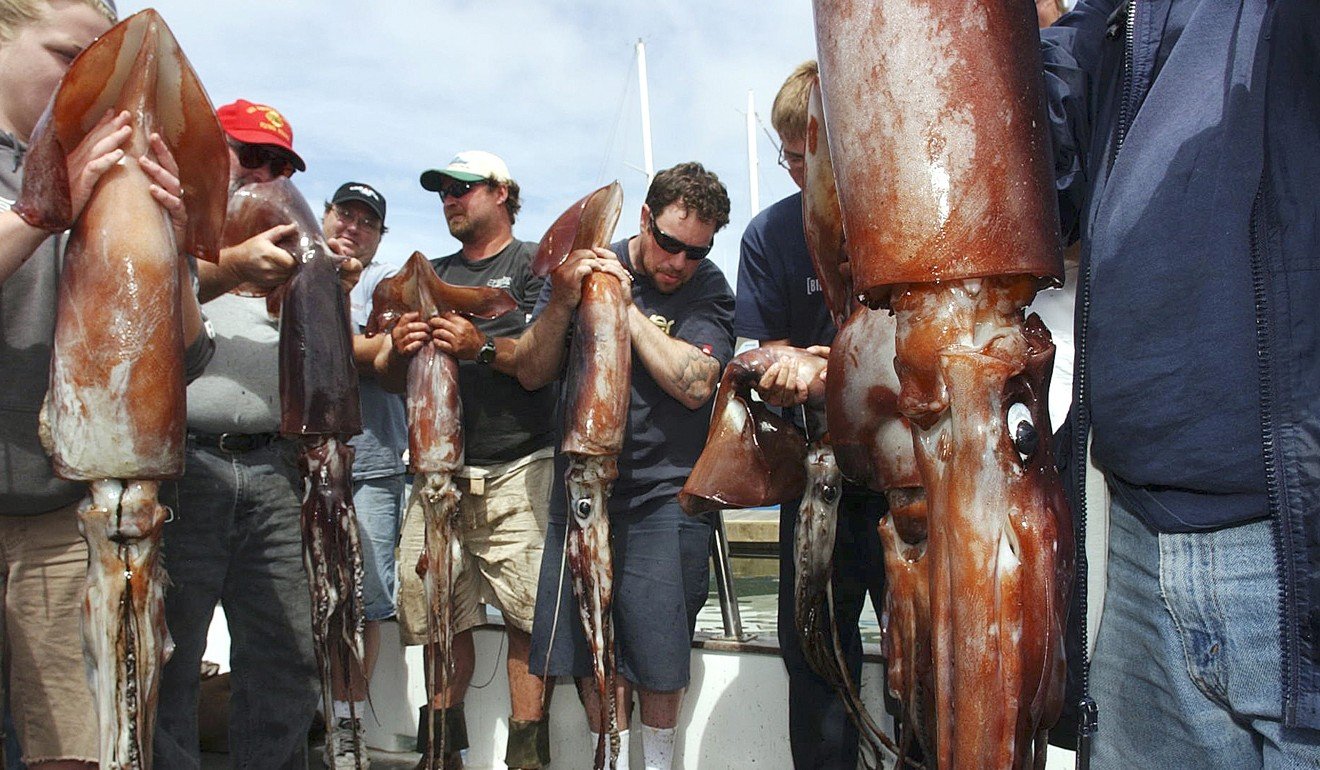
The meetings aimed to regulate competition and reduce the risk of over-jigging. A squid colony could collapse if there were too many boats in one area of water.
China always gets the biggest share, in part because it has the most comprehensive and reliable information on the quantity and location of potential squid resources that could vary considerably from year to year, according to another researcher in the national squid research programme, who took part in the meetings.
The owner of a squid jigging company in Taiwan told the South China Morning Post that they faced tough, sometimes unfair competition from mainland Chinese fishing boats.
“They sometimes come in large numbers and sweep away most of the catch,” said the shipowner, who was also a member of the Taiwan Squid Fishery Association, the trade organisation for squid jiggers on the island.
But there have been few protests. The Taiwanese squid fishing industry regularly sends representatives to mainland China for the latest analysis and forecasts.
“We depend very much on the information, so no one dared to point a finger and say, ‘You are bullying,’” said the man, who asked not to be named, in fear of repercussions from mainland counterparts.
THE HIGHEST BIDDER
China’s power in squid fishing has also been felt in the West.
The US imported a record amount of squid from China in 2016, despite nearly a 30 per cent price increase, according to the International Trade Centre, the joint agency of the World Trade Organisation and the United Nations.
One trader told Undercurrent News, a London-based industry news website covering fishing and seafood markets, that the rise in price for squid came alongside a drop in quality.
The squid received by the US consisted of as much as 30 to 50 per cent water, whereas in previous years the water content could be as low as 10 per cent.
“The good stuff will always go into the domestic market in China and the low-quality stuff will go to the US,” the trader was quoted by the Undercurrent News as saying.
A Europe-based trader, who requested not to be named because they had to import products from China, told the Post the quality of squid had dropped, prompting complaints from some clients.
Though relatively cheap, the squid from China was “nowhere near the octopus caught by European fishers in terms of quality. Usually I don’t recommend people to buy it,” he said.
Zhang Jiejian, marketing director of Huacai Zhaoyu, a mobile-based business-to-business trading platform for frozen seafood products in Beijing, said the highest-quality squid were mainly sold to markets in the Far East, especially Japan and South Korea, where people like to eat the squid raw.
Chinese customers were also willing to pay a higher price for higher-quality products, he said.
“There is absolutely no bias – the best stuff goes to the buyer paying the highest price,” Zhang said. “This is free trade. It is fair to everyone.”

